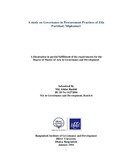A study on governance in procurement practices of Zila Parishad, Nilphamari
Abstract
Zila Parishad is one of the oldest institutions in Bangladesh. From the very beginning it plays
important role to develop rural institutions like social, educational, religious etc. and rural
communication network infrastructures like roads, bridges, culverts etc. To perform those
service oriented activities Zila Parishad is engaged in procurement of goods and works from
its journey in the region. In the year 1817 the then British Legislative Council passed the
District Board Cess Committee bill and under this act District Board Cess Committee was
formed in every district headed by the District Magistrate, which was the foundation of Zila
Parishad. The duty of the committee was to collect tax and build roads. In 1885 selfgovernment
act was passed, District Board was established in sixteen districts under this act,
among them five were in Bangladesh (Dhaka, Jessor, Khulna, Faridpur and Pabna). In 1969
under Basic Democracy Order District Board was renamed as District Council. In that time
there was district councils in all 19 districts. In 1976 Local Government Ordinance was
passed and District council was renamed as Zila Parishad. Now there are three hill district
Zila Parishads having different structure with more autonomy and other 61 districts have Zila
Parishads with limited autonomy. In 2010, Administrators in 61 Zila Parishads have been
nominated by the government, and all are ruling party leaders. Now Administrators are the
chairmen of Zila Parishad Development Coordination Committee and Upazila Chairmen,
UNOs and head of the different development departments are the members. The principal
duty of all Zila Parishads is to develop rural infrastructures, i.e. all Zila Parishads are engaged
in procurements. Quality of governance in Zila Parishads mostly depends upon the quality of
procurement. But excessive administrative control, lack of human resources, training and
experience, lack of transparency & accountability and illegal interference of local elites,
mastans and politicians are the main barriers in establishing good governance in procurement
practices of Zila Parishads. During study it has been seen that role of committee members is
not effective. The present dissertation has tried to evaluate how far good governance is
prevailing and what are the barriers in establishing good governance in the procurement
practices of Zila Parishads, what is the outcome of the prevailing procurement practices in
developing rural infrastructure and service delivery and whether the citizens are satisfied or
not, and at the same time through analysis identified the prevailing problems in contract
management, time management, cost management, quality management and quantity
management.

